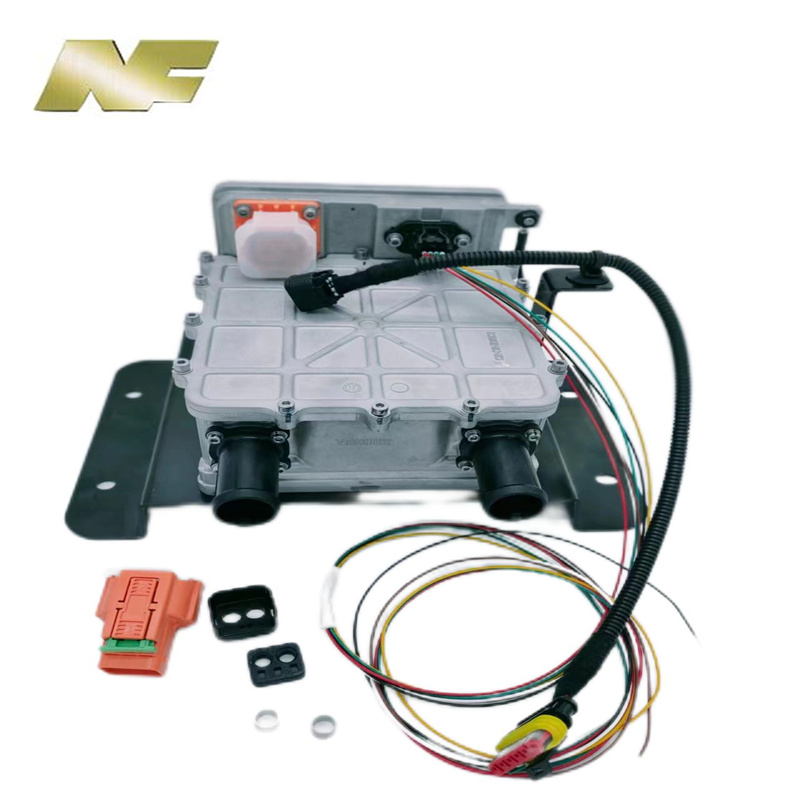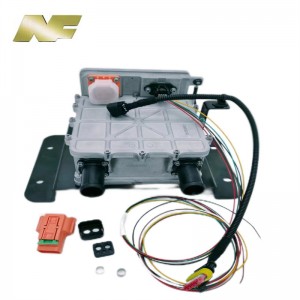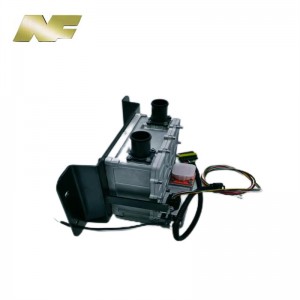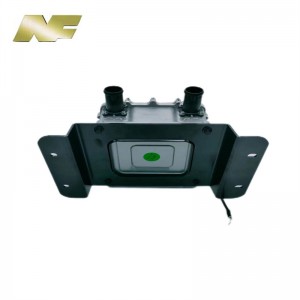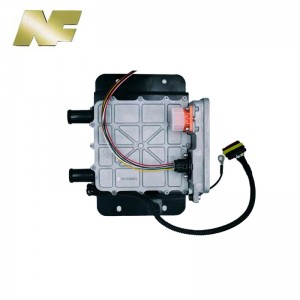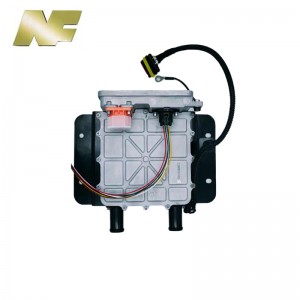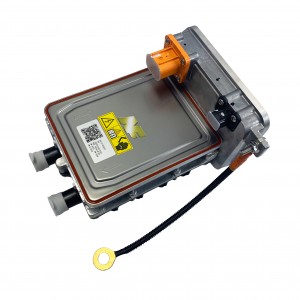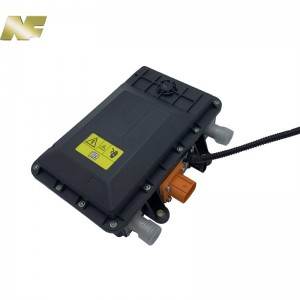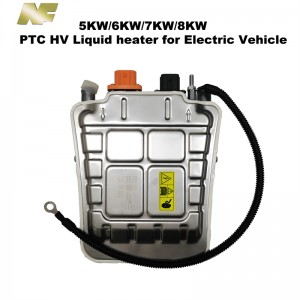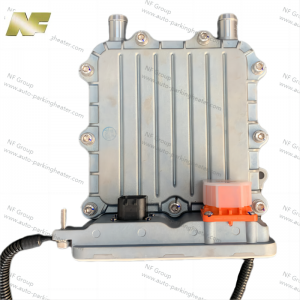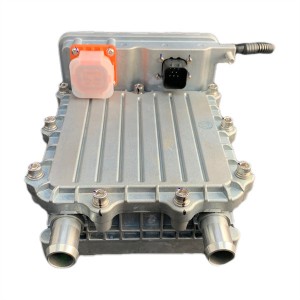NF DC24V 600V High Voltage Coolant Heater 10KW HVCH Electric Coolant Heater
Technical Parameter
| Rated power | ≥9KW@20LPM@20℃ |
| Rated voltage | 600VDC |
| High voltage range | 380-750VDC |
| Low voltage | 24V,16~32V |
Packaging & Shipping


Advantage
*Long service life
*Best price, best quality, best after-sales service
*Proven PTC heating technology and high voltage technology
*Easy to install
*Protection grade IP67
Description
In recent years, the automotive industry has undergone a significant shift towards more environmentally friendly and energy-saving solutions. The rise of electric vehicles (EVs) is a key driver of this shift. As electric vehicle technology continues to advance, a key aspect of its development is the efficient heating of vehicle coolant during cold weather conditions. In this blog, we'll delve into the world of electric coolant heaters, focusing specifically on the cutting-edge high-pressure PTC heater, and explore how it's revolutionizing the automotive industry.
Learn about electric coolant heaters
Traditional internal combustion engine vehicles rely on heat generated by the engine to heat the cabin and heat coolant. However, electric vehicles use different heating principles and require specialized solutions to heat the coolant. Electric coolant heaters are designed to maintain the optimal temperature of the coolant in electric and hybrid vehicles, ensuring efficient energy use and extending battery life.
High Voltage PTC Heaters: Redefining Efficiency and Performance
One breakthrough technology that has emerged in recent years is the high-pressure PTC heater. PTC stands for positive temperature coefficient and refers to the unique heating element used in this type of heater. Unlike traditional heating elements, PTC heaters offer several advantages that make them ideal for electric coolant heaters.
Efficient and fast heating
High-voltage PTC heaters are known for their ability to produce heat quickly and efficiently. When a high voltage is applied to a PTC material, its resistance increases exponentially, generating a large amount of heat. This outstanding feature ensures a fast and efficient warm-up process, allowing electric vehicles to quickly reach optimal operating temperatures. This therefore reduces the energy consumption required to heat the coolant, thereby maximizing overall energy efficiency.
Safe and reliable
High-voltage PTC heaters are inherently self-regulating, increasing their safety and reliability. As the temperature increases, the resistance of the PTC material increases, thus limiting the heat generated and avoiding any risk of overheating. This built-in safety mechanism is invaluable in ensuring the longevity of the heater while providing a safe heating solution for EV users.
Multifunctional application
Another distinguishing feature of high-voltage PTC heaters is their versatility. This technology can be used in a variety of heating applications beyond electric coolant heaters. Due to its efficiency, safety and adaptability, it has the potential to be widely adopted in other industries. From HVAC systems to water heaters, high-pressure PTC heaters offer promising solutions in different areas.
Environmental friendly
The shift to electric vehicles is driven primarily by a desire to reduce greenhouse gas emissions and combat climate change. High-pressure PTC heaters perfectly meet this goal. By minimizing energy consumption during heating, it not only optimizes the performance of electric vehicles, but also extends battery life and extends driving range. The technology thus contributes significantly to reducing the overall carbon footprint associated with electric vehicles.
in conclusion
As the electric vehicle market continues to grow exponentially, the need for efficient, reliable heating solutions becomes increasingly important. High-pressure PTC heaters represent a major breakthrough, offering superior performance, safety and environmental benefits. This pioneering technology plays a key role in shaping the future of the automotive industry by maximizing energy efficiency, optimizing heating processes and extending battery life. As electric coolant heating technology continues to advance, we can look forward to a greener, more sustainable future in transportation.
Application

FAQ
1. What is a high voltage heater in automotive applications?
High-voltage heaters are components used in automotive systems to generate heat for various purposes. It is powered by a high-voltage power source, usually higher than the standard 12 volts, and provides warmth to specific areas of the vehicle such as the cabin, engine bay, and even certain components such as the catalytic converter.
2. How do high-voltage heaters in automotive systems work?
High-voltage heaters in automotive systems typically utilize electrical resistors to generate heat. Heaters include resistors that convert electrical energy into thermal energy. When current flows through a resistor, it encounters resistance, which creates heat. The heat generated can then be used to heat different parts of the vehicle as needed.
3. What are the advantages of using high-voltage heaters in automotive systems?
High-voltage heaters offer several advantages in automotive applications. First, they produce more heat than traditional 12-volt heaters, allowing for faster, more efficient warm-up times. Additionally, high-pressure heaters can often provide heat to multiple areas within a vehicle simultaneously, thereby increasing overall comfort. Additionally, they help improve energy efficiency by using higher voltage power supplies.
4. Can high-voltage heaters be used to defrost vehicles?
Yes, high voltage heaters are commonly used for vehicle defrosting. By directing warm air over the windshield and windows, these heaters can quickly melt ice, frost or condensation, providing drivers with a clear view. Some high-pressure heaters also feature advanced defrost technology, such as integrated sensors and automatic temperature control, to optimize the defrost process.
5. Are high voltage heaters safe for automotive applications?
Yes, high-voltage heaters designed for automotive applications are generally safe when installed and used correctly. They are rigorously tested and adhere to strict safety standards to ensure proper insulation, protect against electrical faults, and protect against overheating. However, it is important to follow the manufacturer's guidelines and have the heater installed by a qualified professional to ensure safe operation.
6. Can old vehicles be retrofitted with high-voltage heaters?
Yes, it is possible to retrofit a high-voltage heater on an older vehicle as long as the necessary modifications are made to the electrical system. However, retrofits may require significant changes to existing wiring and distribution setups. It is recommended to consult an automotive expert or professional installer to assess the feasibility and compatibility of retrofitting the high-pressure heater to a specific vehicle model.
7. Does the high-voltage heater affect fuel consumption?
The impact of a high-voltage heater on fuel consumption depends largely on its usage and efficiency. Although high-voltage heaters consume more electricity than standard 12-volt heaters, they generally warm up the vehicle more quickly, allowing the engine to reach optimal operating temperature more quickly. This therefore reduces overall fuel consumption during cold starts and short distances. However, it is recommended to refer to the manufacturer's specifications and recommendations regarding fuel efficiency.
8. Are high voltage heaters compatible with alternative fuel vehicles?
Yes, high-voltage heaters are compatible with alternative fuel vehicles such as electric or hybrid vehicles. These heaters can utilize the high-voltage batteries or powertrains available in these vehicles to generate heat. In addition, high-voltage heaters can be integrated with advanced vehicle heating systems to optimize overall energy use using energy regeneration during braking or power delivery.
9. What maintenance is required for high-voltage heaters in automotive applications?
High voltage heaters in automotive applications generally require minimal maintenance. However, regular inspections should be performed to ensure proper insulation, connections, and overall functionality. It is recommended to follow the manufacturer's maintenance guidelines and consult an expert if any abnormalities or malfunctions are detected. In addition, related electrical systems may need to be inspected periodically to ensure safe and reliable operation.
10. Can a high-voltage heater be used as the sole heating source in a vehicle?
While high-voltage heaters can provide substantial heat output, they are generally designed to supplement a vehicle's existing heating system rather than completely replace it. In extremely cold conditions, it may be necessary to rely on additional heating sources, such as an engine coolant heater or an auxiliary heater, to effectively achieve the desired cabin temperature. In extreme climates, there may be limitations to using high-pressure heaters as the sole heating source.

